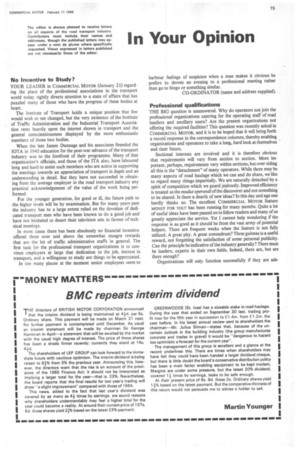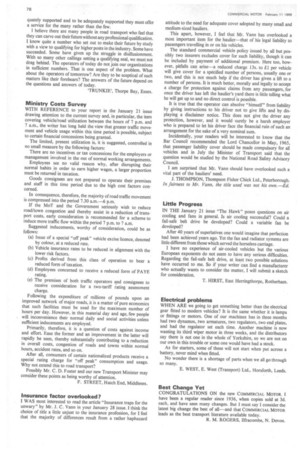In Your Opinion
Page 77

Page 78

If you've noticed an error in this article please click here to report it so we can fix it.
No Incentive to Study?
YOUR LEADER in COMMERCIAL MOTOR (January 21) regarding the place of the professional associations in the transport world today rightly directs attention to a state of affairs that has puzzled many of those who have the progress of these bodies at heart.
The Institute of Transport holds a unique position that few would wish to see changed, but the very existence of the Institute of Traffic Administration and the Industrial Transport Association rests heavily upon the interest shown in transport and the general conscientiousness displayed by the more enthusiastic members of those two bodies.
When the late James Dunnage and his associates founded the IOTA in 1945 education for the post-war advance of the transport industry was to the forefront of their programme. Many of that organization's officials, and those of the ITA also, have laboured long and hard to assist such members who are active in supporting the meetings towards an appreciation of transport in depth and an understanding in detail. But they have not succeeded in obtaining from the average employer in the road transport industry any practical acknowledgement of the value of the work being performed.
For the younger generation, for good or ill, the future path to the higher levels will be by examination. But for many years past the industry has to a large extent relied on the devotion of dedicated transport men who have been known to do a good job and have not hesitated to desert their television sets in favour of technical meetings.
In most cases there has been absolutely no financial incentive offered them over and above the somewhat meagre rewards that are the ' lot of traffic administrative staffs in general. The first task for the professional transport organizations is to convince employers at large that dedication to the job, interest in transport, and a willingness to study are things to be appreciated.
In too many places at the moment senior employees seem to harbour feelings of suspicion when a man makes it obvious he prefers to devote an evening to a professional meeting rather than go to bingo or something similar.
CO-ORDINATOR (name and address supplied).
Professional qualifications
THE BIG question is unanswered. Why do operators not join the professional organizations catering for the operating staff of road hauliers and ancillary users? Are the present organizations not offering the required facilities? This question was recently asked in COMMERCIAL MOTOR, and it is to be hoped that it will bring forth a record response in the correspondence columns, thereby enabling organizations and operators to take a long, hard look at themselves and their future.
Sectional interests are involved and it is therefore obvious that requirements will vary from section to section. More important, perhaps, requirements vary within sections, but over-riding all this is the "detachment" of many operators. While there may be many aspects of road haulage which we can and do share, we like to regard many things impartially. We are naturally detached by a spirit of competition which we guard jealously. Improved efficiency is treated as the modus operandi of the discoverer and not something to be shared. Is there a dearth of new ideas? In this day and age one hardly thinks so. The excellent COMMERCIAL MOTOR feature MONEY FOR YOU? has been running for many months. Quite a lot of useful ideas have been passed on to fellow readers and many of us greatly appreciate the service. Yet I cannot help wondering if the response is as good as it should be from the vast army of potential helpers. There are frequent weeks when the feature is not fully utilized. A great pity. A great conundrum? Three guineas is a useful reward, not forgetting the satisfaction of some personal publicity. Can the principle be indicative of the industry generally? There must be leaders; experts in their own fields. Indeed, there are, but are there enough?
Organizations will only function successfully if they are ade quately supported and to be adequately supported they must offer a service for the many rather than the few.
I believe there are many people in road transport who feel that they can carve out their future without any professional qualification. I know quite a number who set out to make their future by study with a view to qualifying for higher posts in the industry. Some have succeeded. Some have given up the struggle in disillusionment. With so many other callings setting a qualifying seal, we must not drag behind. The operators of today do not join our organizations in sufficient numbers. That is one aspect of the problem. What about the operators of tomorrow? Are they to be sceptical of such matters like their forebears? The answers of the future depend on the questions and answers of today.
`TRUNKIE', Thorpe Bay, Essex.
Ministry Costs Survey
WITH REFERENCE to your report in the January 21 issue drawing attention to the current survey and, in particular, the item covering vehicle/road utilization between the hours of 7 p.m. and 7 a.m., the writer has long held the view that greater traffic movement and vehicle usage within this time period is possible, subject to certain financial concessions being granted.
The limited, present utilization is, it is suggested, controlled in no small measure by the following factors: There are no incentives or tax concessions for the employers or management involved in the out of normal working arrangements.
Employees see no valid reason why, after disrupting their normal habits in order to earn higher wages, a larger proportion must be returned in taxation.
Goods consignees are not prepared to operate their premises and staff in this time period due to the high cost factors concerned.
In consequence, therefore, the majority of road traffic movement is compressed into the period 7.30 a.m.-6 p.m.
If the MoT and the Government seriously wish to reduce road/town congestion and thereby assist in a reduction of transport costs, early consideration is recommended for a scheme to induce more traffic flow within the period 7 p.m. to 7 a.m.
Suggested inducements, worthy of consideration, could be as follows: (a) Issue of a special "off peak" vehicle excise licence, denoted by colour, at a reduced rate.
(b) Vehicle insurance rates to be reduced in alignment with the lower risk factors.
(c) Profits derived from this class of operation to bear a reduced form of taxation.
(d) Employees concerned to receive a reduced form of PAYE rating.
(e) The premises of both traffic operators and consignees to receive consideration for a two-tariff rating assessment charge.
Following the expenditure of millions of pounds upon an improved network of major roads, it is a matter of pure economics that such facilities must be used for the maximum number of hours per day. However, in this material day and age, few people will inconvenience their normal daily and social activities unless sufficient inducements are employed.
Primarily, therefore, it is a question of costs against income and effort. Ease the former and an improvement in the latter will rapidly be seen, thereby substantially contributing to a reduction in overall costs, congestion of roads and towns within normal hours, accident rates, and so on.
After all, consumers of certain nationalized products receive a special rating charge for "off peak" consumption and usage. Why not extend this to road transport?
Possibly Mr. C. D. Foster and our new Transport Minister may consider these points as being worthy of attention.
F. STREET, Hatch End, Middlesex.
Insurance factor overlooked?
I WAS most interested to read the article "Insurance traps for the unwary" by Mr. J. C. Vann in your January 28 issue. I think the choice of title a little unjust to the insurance profession, for I feel that the majority of differences result from a rather haphazard attitude to the need for adequate cover adopted by many small and medium-sized hauliers.
This apart, however, I feel that Mr. Vann has overlooked a most important item for the haulier—that of his legal liability to passengers travelling in or on his vehicles.
The standard commercial vehicle policy issued by all but possibly two insurers excludes cover for such liability, though it can be included by payment of additional premium. Here too, however, pitfalls can arise—a reduced charge 13s. to /1 per vehicle will give cover for a specified number of persons, usually one or two, and this is not much help if the driver has given a lift to a number of persons. It is much better, morally and legally to accept a charge for protection against claims from any passengers, for once the driver has left the haulier's yard there is little telling what he will get up to and no direct control is possible.
It is true that the operator can absolve "himself" from liability by giving instructions to his driver not to give lifts and by displaying a disclaimer notice. This does not give the driver any protection, however, and it would surely be a harsh employer who is prepared to let his driver face the financial ruin of such an arrangement for the sake of a very nominal sum.
Incidentally, your readers will be interested to know that the Bar Council recommended the Lord Chancellor in May, 1965, that passenger liability cover should be made compulsory for all vehicles and in July the Minister of Transport said that the question would be studied by the National Road Safety Advisory Council.
I am surprised that Mr. Vann should have overlooked such a vital part of the hauliers' need.
J. THOMPSON, Thompson Fisher Chick Ltd., Peterborough. In fairness to Mr. Vann, the title used was not his own.—Ed.
Little Progress
IN THE January 21 issue "The Hawk" poses questions on air cooling and fans in general. Is air cooling successful? Could a fail-safe belt drive be developed? Could a variable fan be developed?
After 40 years of superlatives one would imagine that perfection had been achieved years ago. Yet the fan and radiator systems are little different from those which served the horseless carriage.
I have no experience of air-cooled vehicles but the various European exponents do not seem to have any serious difficulties. Regarding the fail-safe belt drive, at least two possible solutions have occurred to me. So if your writer can find a manufacturer who actually wants to consider the matter, I will submit a sketch for consideration.
T. HIRST, East Herringthorpe, Rotherham.
Electrical problems
WHEN ARE we going to get something better than the electrical gear fitted to modern vehicles? It is the same whether it is lamps or fittings or motors. One of our machines has in three months had two dynamos, two armatures, two regulators, two end plates, and had the regulator set each time. Another machine is now wanting its third wiper motor in three weeks, and the distributors say there is not one in the whole of Yorkshire, so we are not on our own in this trouble or some one would have had a stock.
As for starters, some of these will not start when put across a battery, never mind when fitted.
No wonder there is a shortage of parts when we all go through so many.
E. WEST, E. West (Transport) Ltd., Horsforth, Leeds.
Best Change Yet
CONGRATULATIONS ON the new COMMERCIAL MOTOR. I have been a regular reader since 1936, when copies sold at 3d. each, and have seen many changes. But I must say I consider the latest big change the best of all—and that COMMERCIAL MOTOR leads as the best transport literature available today.
R. M. ROGERS, Ilfracombe, N. Devon.




























































































































